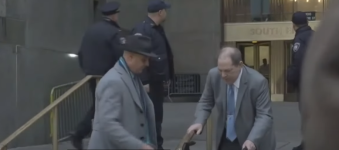
The Verdict: Harvey Weinstein, once a powerful Hollywood mogul, was convicted in 2020 of rape and sexual assault, marking a significant victory for the #MeToo movement. The verdict signaled a shift in attitudes toward sexual misconduct and underscored the importance of holding perpetrators accountable.
Celebration and Hope: Many hailed the verdict as a triumph of justice and a beacon of hope for survivors of sexual violence. It served as a reminder that no one is above the law, regardless of their status or influence.
2. Grounds for Appeal: Examining Legal Technicalities
Legal Maneuvering: Weinstein’s legal team immediately initiated an appeal, citing various legal technicalities and alleged irregularities during the trial. These included issues related to jury selection, prosecutorial misconduct, and the admissibility of evidence.
Appeals Process: The appeals court carefully reviewed the arguments presented by both sides, weighing the evidence and considering the application of the law. Ultimately, they determined that errors made during the trial warranted overturning the conviction.
3. Public Reaction: Outrage and Disbelief
Mixed Emotions: The news of Weinstein’s conviction being overturned evoked a range of emotions among the public. Many expressed outrage and disbelief, questioning the integrity of the legal system and the extent of Weinstein’s influence.
Doubts and Concerns: Some individuals raised concerns about the message sent by the reversal, fearing it could discourage survivors from coming forward and seeking justice. Others criticized what they perceived as a failure of the justice system to protect victims.
4. Implications for #MeToo: A Step Backward or Forward?
Impact on #MeToo: Weinstein’s case has been closely intertwined with the #MeToo movement since its inception. The overturning of his conviction raises questions about the movement’s progress and effectiveness in combatting sexual misconduct.
Continued Advocacy: Despite the setback, advocates remain steadfast in their commitment to advancing the goals of #MeToo. They view the Weinstein case as a catalyst for ongoing dialogue and action aimed at preventing and addressing sexual violence.
5. Weinstein’s Legal Battles: What Lies Ahead?
Legal Limbo: With his conviction overturned, Weinstein’s legal battles are far from over. He still faces additional charges in Los Angeles and numerous civil lawsuits from accusers seeking justice and compensation.
Ongoing Scrutiny: Weinstein’s actions and legal proceedings continue to attract intense media scrutiny, highlighting the intersection of celebrity, power, and accountability in the justice system.
6. The Power Dynamics at Play: Wealth, Influence, and Justice
Privilege and Power: Weinstein’s case has underscored the pervasive influence of wealth and privilege in the pursuit of justice. Critics argue that his status as a wealthy and influential figure afforded him certain advantages throughout the legal process.
Inequality in Justice: The case has reignited conversations about systemic inequality within the justice system, particularly concerning how it treats individuals based on their socioeconomic status and connections.
7. Lessons Learned: Addressing Systemic Issues
Calls for Reform: Weinstein’s case has prompted calls for reforms aimed at addressing systemic issues within the legal system, including more comprehensive support for survivors, improved protocols for handling sexual assault cases, and greater accountability for perpetrators.
Long-Term Solutions: Advocates emphasize the importance of implementing long-term solutions to prevent sexual violence and support survivors, such as comprehensive sex education, bystander intervention programs, and cultural shifts that challenge harmful attitudes and behaviors.
8. Media Coverage: Shaping Public Perception
Media Influence: The extensive media coverage surrounding Weinstein’s case has played a significant role in shaping public perception and understanding of the issues at hand. However, it has also raised concerns about sensationalism and the impact on the judicial process.
Ethical Considerations: Journalists and media outlets face ethical dilemmas when covering high-profile cases like Weinstein’s, balancing the public’s right to information with the need to protect the privacy and dignity of survivors.
9. Victim Advocacy: Ensuring Support and Empowerment
Support for Survivors: Central to the discourse surrounding Weinstein’s case is the importance of supporting and empowering survivors of sexual violence. Organizations and advocacy groups offer a range of services, including counseling, legal assistance, and community resources.
Empowering Voices: The #MeToo movement has empowered countless survivors to share their stories and demand accountability from perpetrators. It has also fostered a sense of solidarity and collective action among individuals affected by sexual violence.
10. Conclusion: Navigating the Complexities of Justice
Reflection and Action: The overturning of Harvey Weinstein’s 2020 rape conviction has prompted reflection on the complexities of the legal system, power dynamics, and societal attitudes toward sexual violence. It underscores the ongoing need for advocacy, reform, and support for survivors.
Frequently Asked Questions
1. Why was Harvey Weinstein’s 2020 rape conviction overturned?
The overturning of Weinstein’s conviction was based on legal technicalities and alleged errors during the trial, including issues related to jury selection and the admissibility of evidence.
2. What does the overturning of Weinstein’s conviction mean for the #MeToo movement?
The reversal has sparked debate about the progress and effectiveness of the #MeToo movement in combatting sexual misconduct. Some view it as a setback, while others see it as an opportunity for continued advocacy and reform.
3. What legal challenges does Weinstein still face?
Despite the overturning of his 2020 conviction, Weinstein still faces additional charges in Los Angeles and numerous civil lawsuits from accusers seeking justice and compensation.
4. How has the media influenced public perception of Weinstein’s case?
Extensive media coverage has played a significant role in shaping public perception and understanding of the issues surrounding Weinstein’s case. However, it has also raised concerns about sensationalism and its impact on the judicial process.
5. What support is available for survivors of sexual violence?
Numerous organizations and advocacy groups offer support services for survivors of sexual violence, including counseling, legal assistance, and community resources aimed at empowering and advocating for survivors.
In conclusion, the overturning of Harvey Weinstein’s 2020 rape conviction has ignited a myriad of discussions about justice, power, and accountability. As society grapples with the implications of this decision, it is imperative to continue supporting survivors, advocating for reform, and working towards a more equitable and just future.



